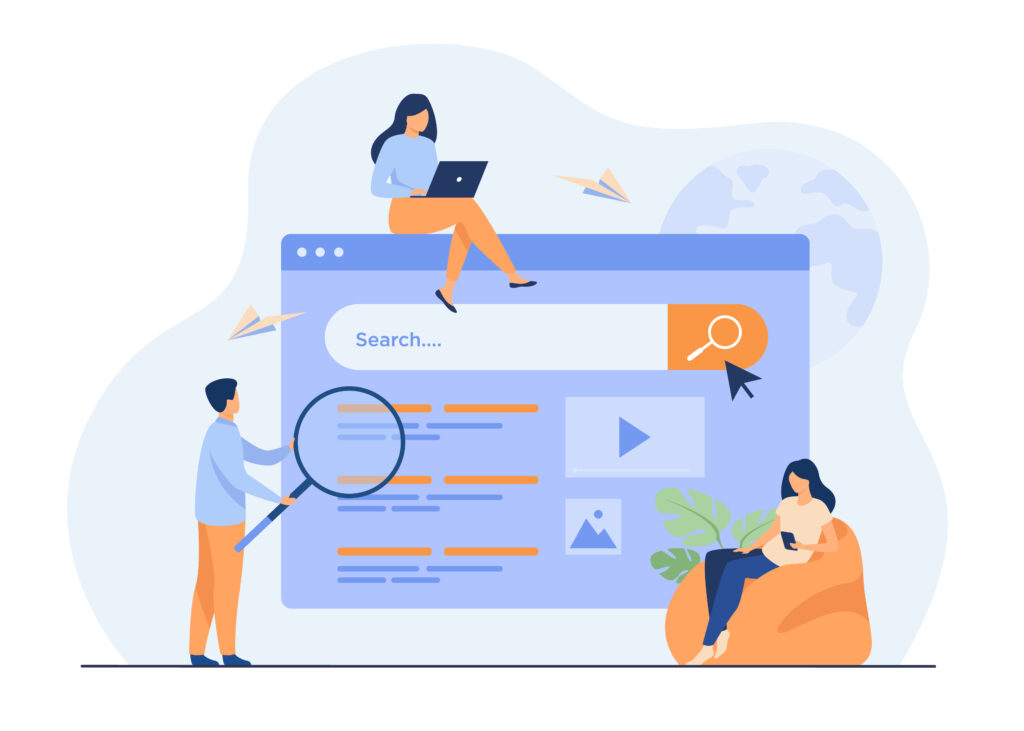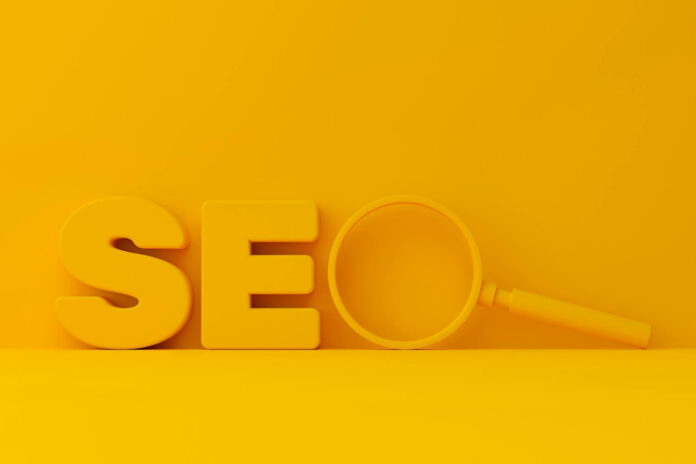SEO is important for this, SEO is important for that, but wait! What is SEO? We know that it is important for any business that aims to gain visibility and outshine its competition. But again, what is it and how to achieve it?
You probably already have an answer in your head, but let us guide you on the real side of SEO, what you need to know, and how SEO can improve your website’s performance.
What is SEO?
At its core, SEO is a multifaceted approach to increasing a website’s visibility when people search for products or services related to your business in Google, Bing, and other search engines. The higher the visibility of your pages in search results, the more likely you are to garner attention and attract prospective and existing customers to your business.
SEO has come a long way from the early days of keyword stuffing and backlink farming. Today, SEO meaning encompasses a broad range of tactics and strategies that aim to improve not only the quantity but also the quality of traffic to your website.
What are the Pillars of SEO?
Now that we have an idea of what SEO is, let’s look into the fundamental elements that constitute a solid SEO strategy, covering keyword research, on-page optimization, off-page tactics, and technical SEO considerations.
On-Page SEO
Essentially, on-page SEO is how your website communicates with search engines. Just picture your website saying, “Hey Google, this is what I’m all about!” Let me demonstrate the simple steps required to make that happen.

- First up, keywords. These are the magic words that people type into a search engine. If you’re all about baking, then use keywords like “best chocolate cake” or “what should I cook today”. You’ll want to use these words here and there on your website so that search engines can match you up with people looking for what you offer.
- Now, think about the content. This is just a fancy way of saying “the words on your page”. Make sure those words are useful and friendly. No stealing words from other websites – keep it original and keep it simple.
- Then there are titles and descriptions. These are the first things people see in search results, like the cover of a book. Make sure they’re inviting and give a quick snapshot of what each page is about.
- Headings are like signposts that guide readers through your page. They break up the text which makes it less overwhelming. Headings are also like little hints to search engines about what’s important in your content.
- Remember the pictures. Although they greatly enhance the appearance of your website, you must use what is known as “alt text” to describe the content of the picture because otherwise search engines are unable to see it. It’s like explaining a photograph to someone over the phone.
- Having a speedy site is super important. Nobody enjoys having to wait around for a page to load. Indeed, over 50% of visitors depart the website as soon as they notice that it is sluggish. It is similar to being caught in rush-hour traffic. A fast-loading site keeps visitors happy and tells search engines that you value their time.
- And lastly, make sure your site is easy to use on a phone. There are so many people browsing the web on their mobiles, that’s why mobile-friendly site is a must. It should be just as easy to navigate on a small screen as it is on a big one.
Technical SEO
Technical SEO is the behind-the-scenes stuff that helps your website work well with search engines. Imagine technical SEO as a house’s foundation. You don’t see it, but it’s super important for making sure the house is solid and everything works right. Let’s see how you can improve your technical SEO.
- First, there’s the sitemap. Sitemap is a list of all the pages that exist on your website. It’s like a map you’d give to a friend so they can find all the rooms in your house. It helps search engines find all your pages easily.
- Next, we’ve got something called crawlability. This just means making sure search engines can move around your website and look at everything. If a search engine can’t get through, it’s like having a locked door in your house. You want all doors open so that Google can come in and understand your site.
- You also want to check that your website doesn’t have duplicate pages. Duplicate pages are like having two rooms in your house that look exactly the same. It can be confusing, and search engines might not know which room to show to guests.
- Then, there’s website security. This is about keeping your website safe from hackers. It’s like having good locks on your doors. Websites that use HTTPS are secure. It tells visitors and search engines that they can trust your site.
- Mobile optimization is also a big part of technical SEO. Just like making sure your house has doors wide enough for all types of visitors, your website should be easy to use on phones and tablets, not just computers.
- Site speed, just like how it’s important for On-page SEO, is also important for technical SEO. It’s like making sure the lights turn on quickly when someone flips the switch. If your website takes too long to load, people might leave before they even see anything.
- And then there’s structured data. This is a bit like sticky notes you put on things to tell people more about them. For a search engine, structured data on a website tells it more about what’s on the page, like if there’s a recipe or a product review, which can help your website show up in more detailed search results.
Off-Page SEO
Off-page SEO is all about what happens outside of your website to improve your rankings in search engines. It’s like the reputation of your website in the big wide world of the internet. Here’s what it involves:
- Think of links from other websites to your website as votes of confidence. The more links you have from good quality sites, the more search engines think, “Hmm, this site must be important”. It’s like being popular in school, if lots of people are talking about you, you must be quite the star, right?
- Social media can also play a part. When people share your website or talk about it on social platforms like Facebook or Twitter, it sends signals to search engines that your site is getting attention.
- Then there’s trust. This comes from having your website linked to reputable sources, like news sites or well-known blogs in your field. It’s like getting a thumbs-up from the experts in your area. Search engines take notice when the big names think you’re worth mentioning.
- Don’t forget about reviews and ratings. Good feedback on other sites can help too. It’s like word-of-mouth in a neighborhood. If everyone’s saying you make the best tacos in town, chances are people will start coming to you when they’re hungry.
- Then there are guest posts. This is when you write something for another website. It’s a bit like making a guest appearance on a TV show. It gets you in front of a new audience and the link back to your site is another one of those handy votes telling search engines you’re a credible source.
Selecting the Right SEO Company and SEO Services
We know that selecting the right SEO agency can be hard. There are so many of them and most of them don’t click with you. You want someone who’s not just savvy about the ins and outs of the internet but also someone who can fulfill your vision.

As for the SEO services, these are the behind-the-scenes magic tricks that pull your website out of the vast sea of internet anonymity. Great SEO services are about fine-tuning your website so when someone’s looking for what you offer, you’re right there in the search results waving at them.
It’s about the right keywords, quick loading times, and getting the digital thumbs up from other sites through links. Each service is a piece of the puzzle that, when put together, forms the big picture of your internet success story.
So, when picking these services, it’s like choosing the right ingredients for a recipe – you need to think about what will bring out the best in your dish, or this case, your website. Take it step by step, and build a strategy that feels as right as your favorite pair of jeans.
What are the Best SEO Tools?
To stay ahead in SEO, you need the right tools. There are various SEO tools available on the market, from SEO checkers to analytics platforms, but how can they help streamline your SEO efforts?
SEO tools are essential for refining and understanding how your website performs in the vast online landscape. We know that there are many tools out there, ranging from SEO checkers that scan your website for easy-to-fix issues to sophisticated analytics platforms that delve deep into your website’s data, knowing which ones to use can be a game-changer.
These tools help streamline your SEO efforts in several ways. They can give you a bird’s-eye view of where you stand. Think of SEO checkers as your website’s health practitioners, giving it a quick check-up and pointing out where it needs improvement for better visibility. They look at things like whether your titles and descriptions are catchy and relevant, or if your website talks in a way that search engines understand.
Then there are analytics platforms. These are like having a wise mentor who keeps an eye on your website’s journey, offering insights into the paths visitors take, which pages they love, and where they might get stuck and leave. When you finally understand these patterns, you can start making changes that keep visitors engaged and coming back.

And let’s not forget about keyword research tools. These are your treasure maps, guiding you to the phrases and questions people are typing into search engines. But besides finding keywords, some tools help with backlinks – the internet’s version of word-of-mouth. They help you track who’s talking about your website, how influential their word is, and how you might earn more of these valuable nods from around the web.
Integrating SEO with Your Overall Marketing Strategy
SEO shouldn’t be siloed from your overall marketing strategy, but it should be a key part of it.
Content marketing and SEO go hand in hand. Crafting content that ranks well organically extends the reach and efficacy of your content marketing strategy.
When creating content with SEO in mind, you’re ensuring that the delectable treats you whip up get tasted by as many people as possible. This means when you write a blog post, film a video, or share a photo, you’re thinking about the keywords that will help people find your content through search engines. You’re also considering how to make that content shareable and engaging so that more people will link to it and share it themselves.

But it’s not just about working together, timing is important too. Knowing when to serve your content can be as important as how you create it. This is where understanding your audience’s behavior and preferences comes into play, integrating your SEO efforts with email marketing, social media, and even offline campaigns.
How to Measure SEO Success
What doesn’t get measured doesn’t get managed. Regular audits with an SEO checker can help you understand where your website stands in terms of SEO best practices and where there’s room for improvement.
These tools can show you how visible your website is on search engines, which is like knowing how many people walk past your garden and admire it. They’ll also point out which parts of your website are doing well, like your blogs or product pages.
And just as important, they’ll tell you what’s not working. Maybe some pages load too slowly, or perhaps some of your content isn’t as good as it could be at attracting the right kind of attention.
Always be ready to adapt your strategy. What worked last year might not work this year, much like how a garden might need different care as the seasons change. Keeping up with your SEO and tweaking it based on what the data tells you is how you’ll win the race in the long run. After all, SEO isn’t a one-time setup. It’s an ongoing journey of improvement, learning, and growth.





Thanks for a detaild view on this theme
Thanks for sharing. I read many of your blog posts, cool, your blog is very good.
I’ve always wanted to learn about SEO, and i just did today with ur blog 🙂
SEO is trully a long term project, and my clients just dont get that sometimes
I like how you simplified the term by saying that the Search Engine Optimization is the process of enhancing your online presence to rank higher on search engine results pages. Some people really don’t understand with broader and more difficult wording other websites use.
Search engine optimisation is really helping my brand pop up on google. Ive been getting many visitors since you explained managed to explain everything in this blog.
I agree that SEO isn’t a one-time trick, Ive been trying to explain this to my colleagues, but they dont listen.
Very well-written and funny! For more details, click here: EXPLORE NOW. Looking forward to everyone’s opinions!
Comments are closed.